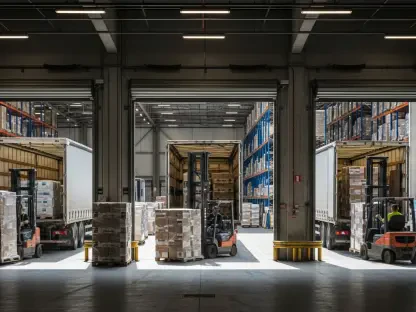As the festive season approaches, looming EU border checks threaten to disrupt the UK’s Christmas food deliveries, potentially causing substantial delays and economic losses. The Entry/Exit System (EES), scheduled to commence on November 10, mandates fingerprint and facial recognition checks for all non-EU passengers at Dover. Logistics UK has raised alarms about the profound impact this system could have, emphasizing that these new requirements might extraordinarily lengthen processing times at the border. While the EES primarily targets non-EU car passengers, its implications could extend to EU truck drivers, leading to significant backlogs.
The timing of this new system is particularly troubling, as it coincides with the critical “food shoulder” period during which the UK depends heavily on fresh imports. Logistics UK officials warn that delays in lorry traffic could jeopardize the timely delivery of goods, specifically UK exports of seafood and other perishables. Research from Imperial College London supports these concerns, indicating each minute of delay could add approximately 10 miles to the queues. Such potential disruptions threaten not only to upset holiday supply chains but also to inflict severe economic drawbacks. An average 90-minute delay per journey could result in the UK economy losing around £400 million annually.
Economic Concerns and Potential Financial Impact
Alongside the logistical challenges, the financial implications of these border delays are worrisome. Logistics UK estimates that border delays cost approximately £1.30 per minute per truck. The potential for 14-hour delays could significantly add up, incurring expenses up to £1,100 per vehicle. These financial strains add another layer of urgency for the need to address the issue proactively. Logistics UK has called on the UK Government to promptly implement a nationwide awareness campaign. They argue that clear communication and guidance will be essential for managing public and industry expectations during this transitional period.
The Government appears to have recognized these concerns to some extent. In August, they allocated £10.5 million to support preparations for the EES, prioritizing infrastructure improvements. However, it is still unclear if these funds will directly address the delays anticipated with the EES. Simple infrastructure improvements may not be enough to mitigate the cumulative delays caused by biometric checks. Logistical uncertainties remain, with the gaps in detailed planning creating an atmosphere of heightened concern as the holiday season approaches. The public awareness campaign being prepared by the Government still lacks specifics, adding to the ambiguity around its effectiveness.
Government and Industry Response
As the holiday season nears, new EU border checks may disrupt the UK’s Christmas food deliveries, leading to significant delays and financial losses. The Entry/Exit System (EES), starting November 10, requires fingerprint and facial recognition checks for all non-EU travelers passing through Dover. Logistics UK has expressed concerns about the substantial impact this could have, highlighting that these new protocols could drastically slow down border processing times. While mainly aimed at non-EU car passengers, the EES could also affect EU truck drivers, causing major delays.
The introduction of this system is worrisome as it coincides with the crucial “food shoulder” period when the UK relies on fresh imports. Logistics UK warns that delays in lorry traffic could risk timely delivery of goods, especially UK seafood and other perishables. Studies from Imperial College London support these concerns, showing that each minute of delay adds about 10 miles to traffic queues. Potential disruptions could not only impact holiday supply chains but also lead to severe economic consequences. A 90-minute delay per journey could cost the UK economy about £400 million annually.









